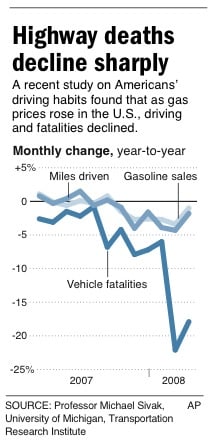A massive lobbying effort spearheaded by General Motors, Ford, and Chrysler has resulted in passage of a $25 billion package of low-cost loans to help them re-tool for the “next generation of fuel-efficient motor vehicles”.
Automakers originally wanted $50 billion (twice what they got last go-round), and even then the plan was supported by both Barack Obama and John McCain. Lobbyists also said they needed the money because U.S. government policies that have hurt their bottom lines.
Critics tried to call their bluff, but to no avail. One analyst with the conservative Heritage Foundation called the loan proposal bunk. As reported in an Associated Press article last week:
“The auto industry certainly is in trouble, but it needs to be restructured,” he said. “The elephant in the room is the fact an election is going on.”
Fresh off their $25 billion victory, auto industry lobbyists are now scrambling to get in on the Big Bailout of the financial industry being debated in Congress. Yesterday, Steve Parker with the HuffingtonPost.com shared a snip from car industry newspaper, Automotive News:
“The American Financial Services Association is asking Congress to allow auto finance companies and other institutions to tap the $700 billion bailout fund designed for the troubled mortgage industry. The trade association, based in Washington, DC, also is proposing that automobile loans be classified as “troubled assets” along with home mortgages.”
The U.S. auto industry just got guaranteed government loans so they can sell more cars, now they want relief for all the poor folks saddled by car debt they created to begin with.
What’s wrong with this picture? Nothing if you’re in the auto business.
I realize how important the U.S. manufacturing sector is and that thousands of Americans rely on these companies to support their families. But the truth is that the car business is on the wane and that’s a great thing for our country.
Americans are driving less (more than 53 billion miles less from November to August compared to same period last year) for many reasons, and it’s not just about high gas prices. Cities are improving their biking and public transit infrastructure, more people are making the environmental connection, the carfree movement is taking hold (several major cities now have Sunday Parkways type events) and every day, more people realize that the romance with cars they’ve been sold since childhood is turning cold.
There are myriad benefits to less car use — one of which is less people getting killed.
In August, the traffic death toll reached its lowest point since the 1960s, a direct result of fewer miles being driven.
But despite the common sense notion that driving less (and buying fewer cars) is a positive trend for America, we have an industry going through (well-deserved) rough times and a government that is happy to cave into their needs.
Where are all the millions automakers made selling unsafe, oversized, gas-gulping SUVs that only now some Americans are wising up to?
Adding insult to injury is that they’re lobbying under the guise of producing “fuel-efficient” vehicles. Does anyone else see the irony here? Didn’t GM kill the electric car and wasn’t it automakers and their suppliers who colluded to run public transit into the ground?
Our nation must realize that the promise of hybrids and other fuel technologies are not the solution to the many problems that come with auto-dependency. It’s not just about saving gas, it’s about saving lives and making our lives better.
Remember how Sunday Parkways felt? The sense of community we had, the great feeling of seeing so many people being active, smiling, and playing in our once car-dominated streets? Those feelings had nothing to do with fuel-efficiency; they had everything to do with the absence of cars.
Remember how it felt the last time you were stuck in (car) traffic? The sense of stress and frustration that came with it? Those feelings would not have changed if you were driving a hybrid; they would have changed if not as many people were driving to begin with.
People are choosing to drive less, and the U.S. auto industry is running scared. Major dealerships are closing all over the country, sales are down, and many factories have already closed their doors.
We need to let this natural shrinkage occur. We need people to re-examine their relationship to their cars. We do not need to help an industry that has run rough-shod over the cultural and physical landscape of America for way too long.
The preservation of our livability and the preservation of a sustainable and safe transportation system that gives Americans mobility choices should take precedence over the preservation of a few thousand blue-collar jobs.
For everyone enlisted in the national “bike movement”, girding for battle in the upcoming re-authorization of the transportation bill, take note of how the auto industry throws their weight around in Washington.
— As always, I’m open to your feedback and thoughts.


